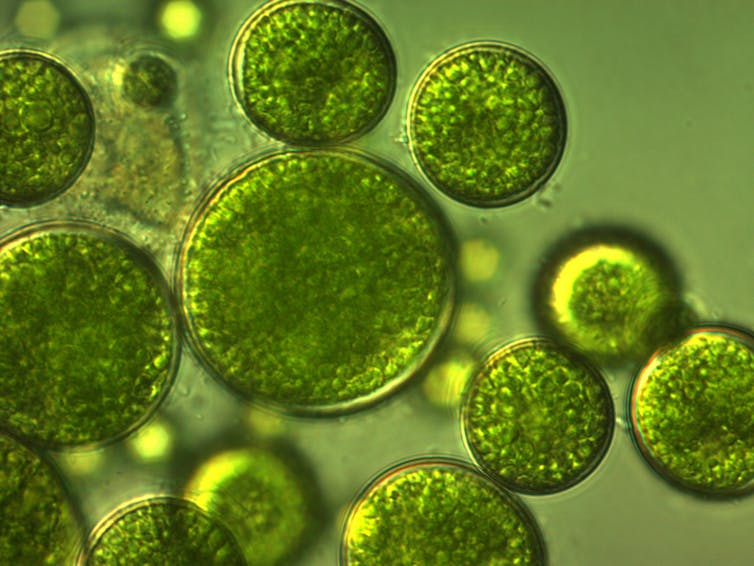UK – New Swansea University research has revealed microalgae could play a crucial role in not only successfully reusing food and farm waste on an industrial scale but also creating thousands of jobs.
Microalgae are microscopic photosynthetic cells found naturally in the oceans and lakes. But in a new article, the University-based ALG-AD research group explains how unwanted nutrients from food waste can be used to grow algae. The algae convert the nutrients into protein which can in turn be fed to farm animals as a replacement to less sustainable soya protein.
A key aim of the ALG-AD project, led by the College of Science, is to investigate this circular economy process which sees nutrients being used to generate another resource of value – creating wealth from waste.
Dr Claudio Fuentes-Grünewald, lead author of the paper, said:
“Implementation of circular approaches in industry, by minimising waste and optimising reuse of resources, is of critical environmental importance.
“Microalgal cultures are particularly adept at waste remediation and are also incredibly versatile in how the biomass produced can be processed and applied.”
The article, published in prestigious journal Bioresource Technology, goes into detail about how the researchers have demonstrated a novel way in which microalgae can grow and remediate organic waste.
So far, the ability of microalgae to solve environmental issues has only been demonstrated on a relatively small scale. Microalgae can grow and produce biomass in different ways depending on conditions and ALG-AD has successfully demonstrated a combination of two different growth modes on an industrial scale at its UK pilot facility at Langage AD, Plymouth, England.
Stay Always Informed
Join our communities to instantly receive the most important news, reports, and analysis from the aquaculture industry.
The team now aims to process the algal biomass for animal feed and other products of value.
Analysis of this biomass has revealed it is higher in protein than the commercially cultivated equivalent, and the algae also show interesting increases in carotenoids, molecules known for their health-boosting properties.
Currently, microalgal biotechnology is still evolving, but is increasing in global prevalence, with applications in industrial fields ranging from pharmaceuticals and cosmetics to feeds and biostimulants.
Dr Fuentes-Grünewald added:
“Our work on ALG-AD has proved that microalgae can be used at scale to consistently produce a quality, sustainably cultivated biomass with multiple commercial applications.
“We believe this technology has the potential to remediate thousands of tonnes of digestate, without the risks of pollution linked to storage or returning this to land. This new circular economy industrial approach could ultimately not only produce large quantities of biomass for animal feed but also create thousands of new sustainable jobs.”
ALG-AD is a four-year Interreg NWE funded project which brings together scientists and engineers from 11 different partners in four countries across North West Europe.
The team is always keen to speak to anyone interested in exploring algal cultivation approaches. For more information please get in touch with Project Manager Louise Hall, or Dr Fuentes-Grünewald.
Reference:
Claudio Fuentes-Grünewald, José Ignacio Gayo-Peláez, Vanessa Ndovela, Eleanor Wood, Rahul Vijay Kapoore, Carole Anne Llewellyn. Towards a circular economy: A novel microalgal two-step growth approach to treat excess nutrients from digestate and to produce biomass for animal feed. Bioresource Technology, Volume 320, Part A,
2021, 124349, ISSN 0960-8524, https://doi.org/10.1016/j.biortech.2020.124349.
Source: Swansea University
Editor at the digital magazine AquaHoy. He holds a degree in Aquaculture Biology from the National University of Santa (UNS) and a Master’s degree in Science and Innovation Management from the Polytechnic University of Valencia, with postgraduate diplomas in Business Innovation and Innovation Management. He possesses extensive experience in the aquaculture and fisheries sector, having led the Fisheries Innovation Unit of the National Program for Innovation in Fisheries and Aquaculture (PNIPA). He has served as a senior consultant in technology watch, an innovation project formulator and advisor, and a lecturer at UNS. He is a member of the Peruvian College of Biologists and was recognized by the World Aquaculture Society (WAS) in 2016 for his contribution to aquaculture.




